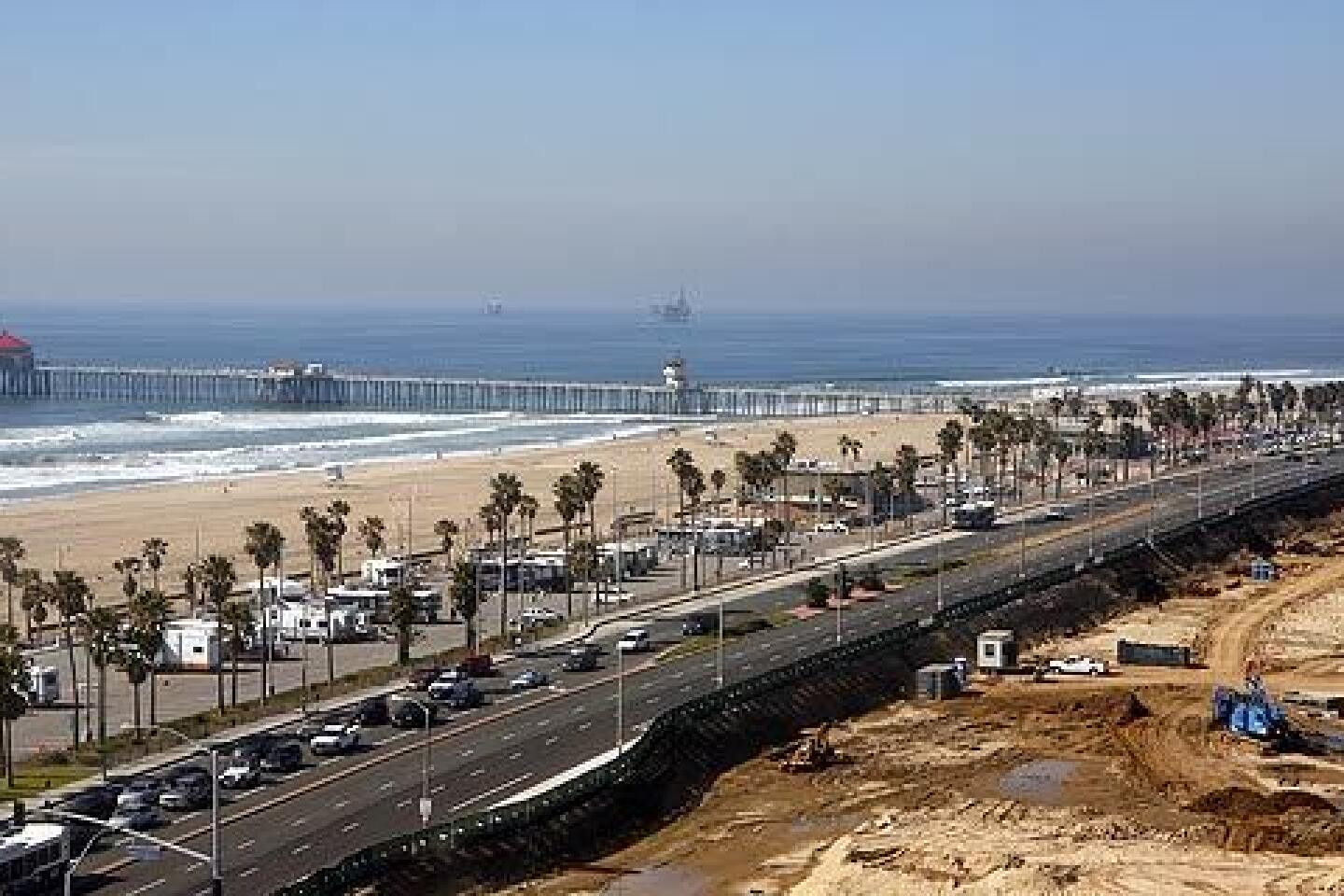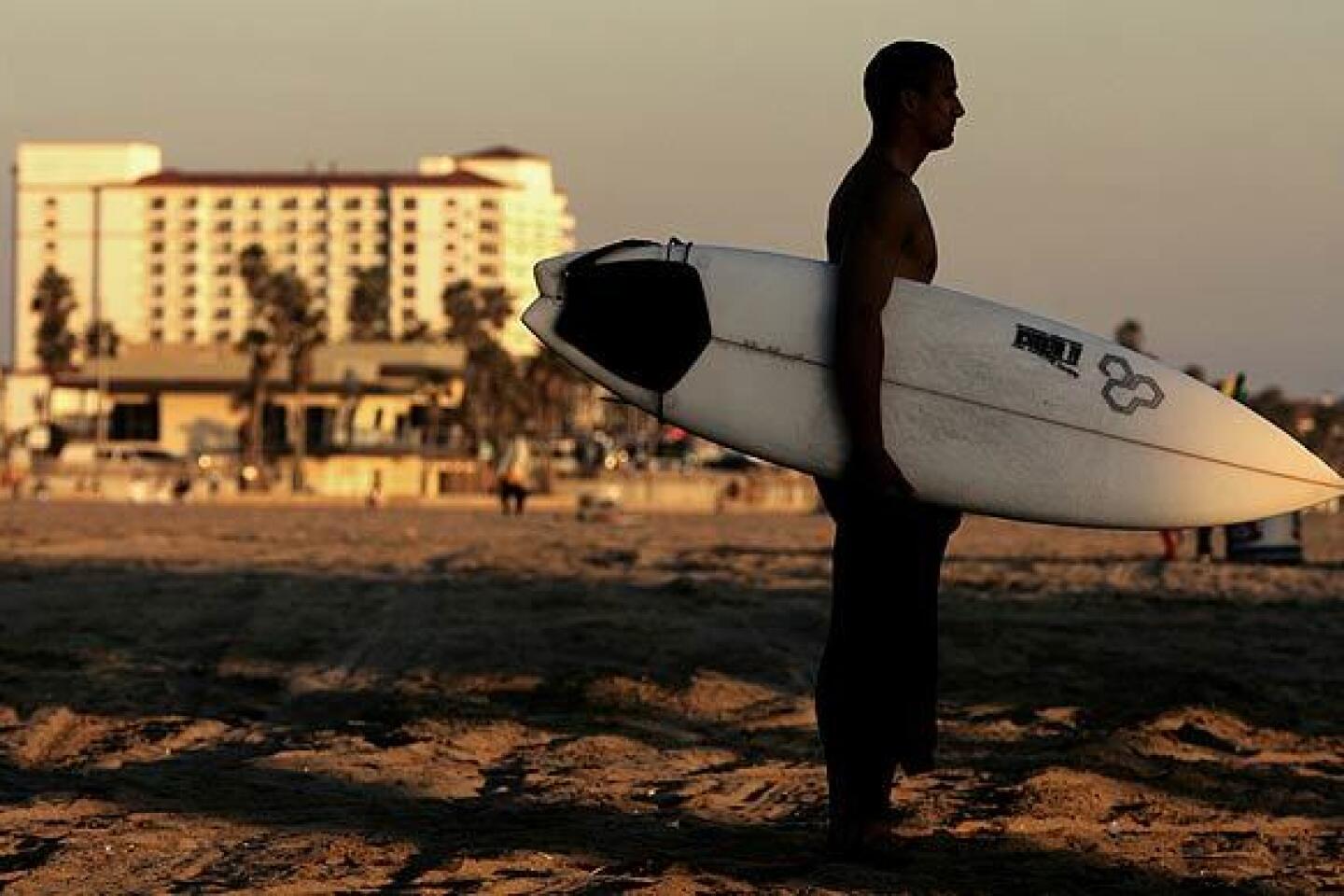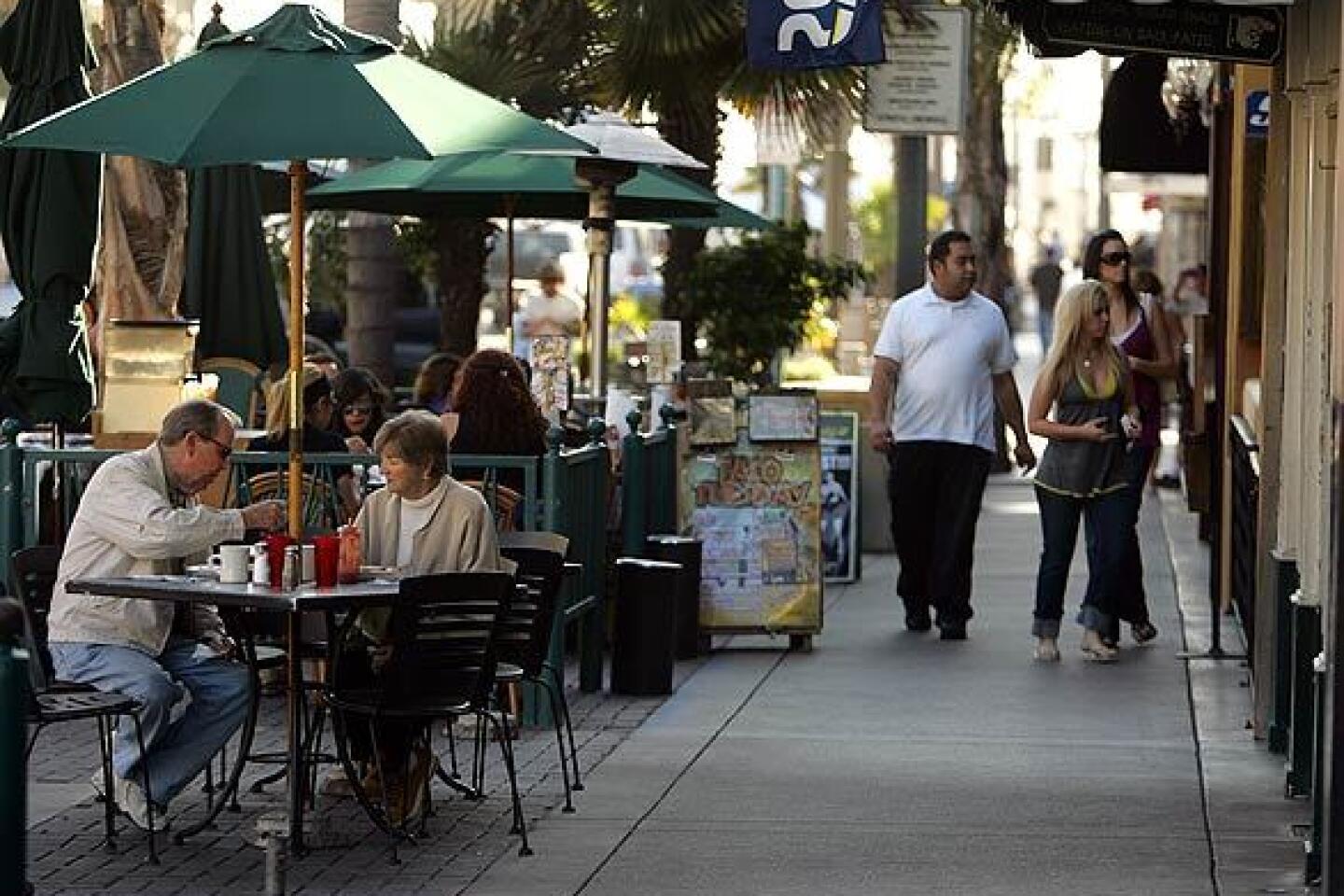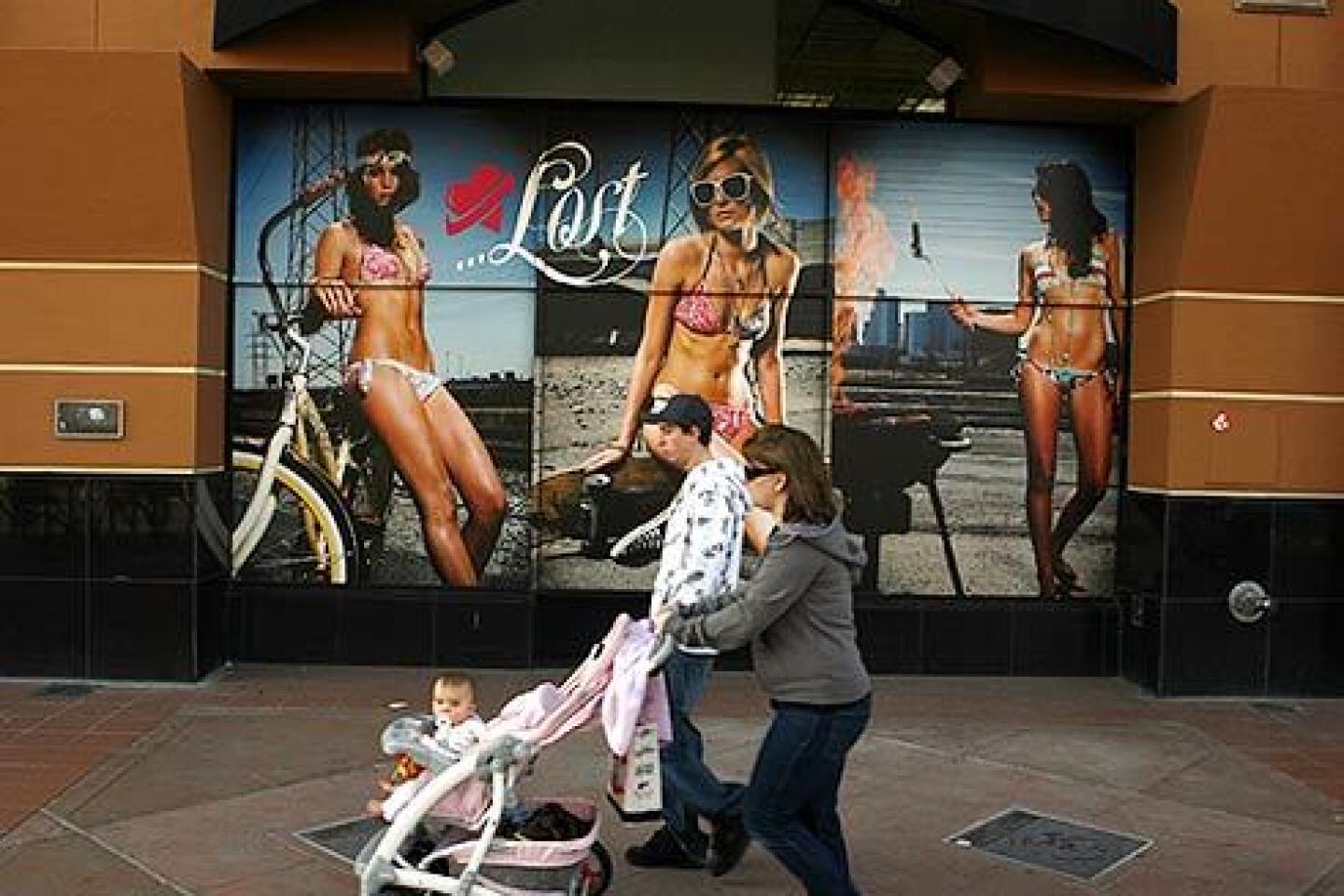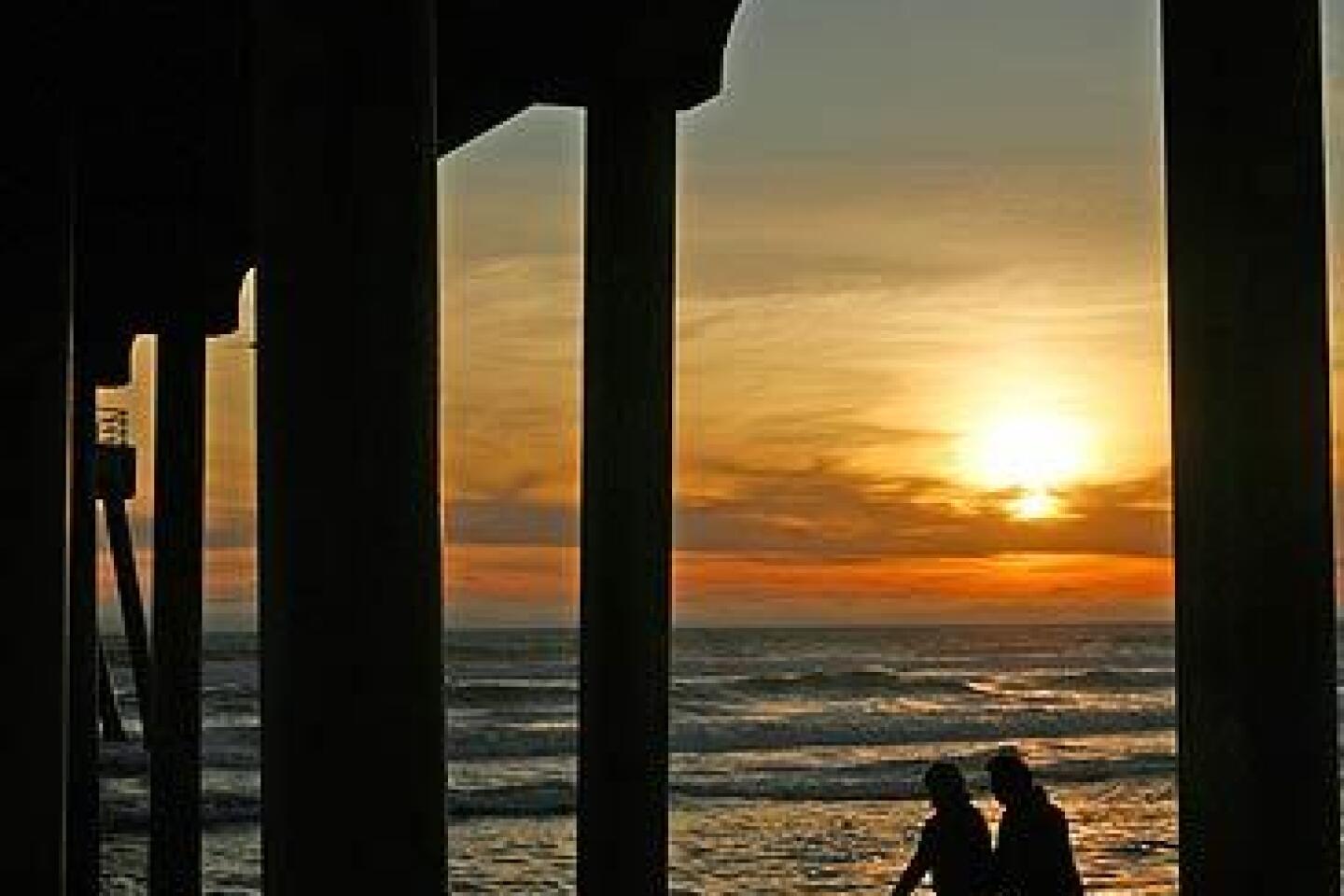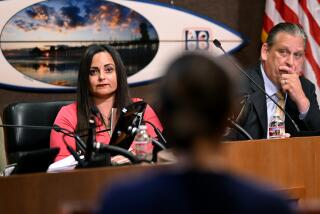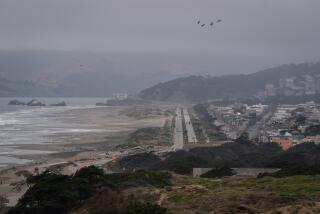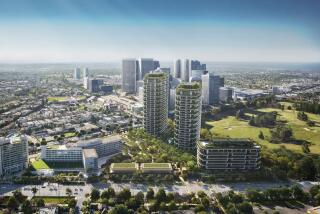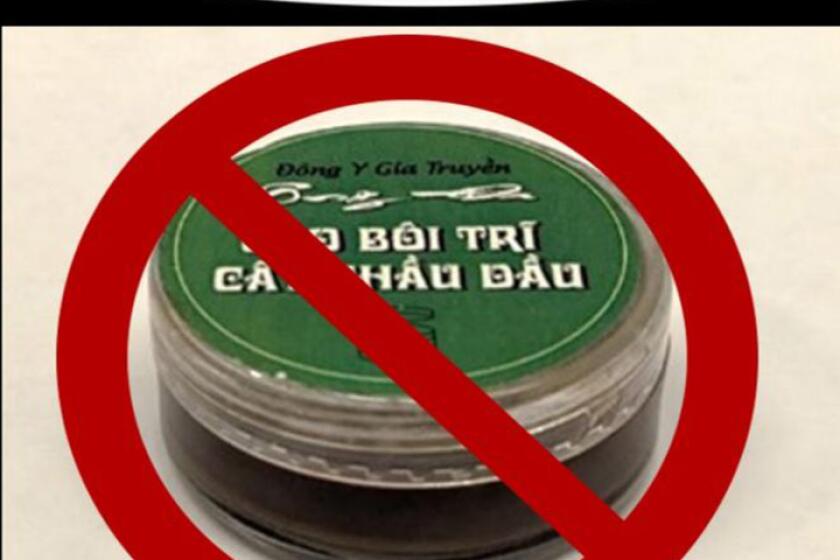Huntington Beach is going upscale
When investors laid claim to a wide stretch of Orange County beach property more than 100 years ago, they named it Pacific City in an idealistic pitch for what they thought could be one of the West Coast’s premier resorts.
Instead, Huntington Beach became an oil boomtown and, later, a surf mecca.
The city has come full circle, and now is banking on tourism as its next big industry.
The downtown is undergoing a wave of construction that in the next few years will bring three beachfront luxury hotels, dozens of shops, restaurants and offices, and hundreds of upper-end homes to the area near the city’s historic pier.
Pacific City is now the name for 31 acres of shops, offices, restaurants and a W Hotel under construction along Pacific Coast Highway, just south of Main Street. The Strand, another downtown development with restaurants, shops, office space and a 157-room Shorebreak Hotel, is scheduled to open this fall. A third hotel, as yet unnamed, is slated for construction between the nearby Hilton and Hyatt resorts.
The idea is to court overnight tourists, according to city officials, putting in place a cornerstone of the City Council’s 2006 strategic plan to “promote tourism” and “transform the city’s economy into a destination economy.”
“We’re going back to our roots,” said Doug Traub, president and chief executive of the city’s Conference and Visitors Bureau. “It was always supposed to be a fun beach town.”
Although the city draws more than 16 million visitors a year, most are on summer day trips to the city’s 8 1/2 miles of wide, undeveloped beach. Business waxes and wanes with the seasons.
Success will depend on how well the new hotels and stores will be able to convince people to stay overnight even when the weather is cold and windy. They also must garner the support of residents, who they hope will make up many of the diners and shoppers keeping the new businesses afloat.
But many locals aren’t wild about the mini-Riviera going up along Pacific Coast Highway.
Billie Kennedy, a retired secretary who lives in a mobile home park across from the Pacific City development, which will include million-dollar condos and an eight-story hotel, fears being “surrounded by big resorts.”
“It was always a beach town, and people would come for the day,” she said. “But now it’s more for the well-to-do, and it’s lost its small-town feeling.”
Although Huntington Beach is among California’s 20 most populous cities at 200,000 residents, it still has not grown comfortable with the intense redevelopment that city planners envision for downtown and other main thoroughfares such as Beach Boulevard.
The city is known for its sometimes quirky events, such as the monthly Dachshund races, along with the annual U.S. Open of Surfing. But locals also treasure small-town festivities such as the Fourth of July parade and frequent long-standing hangouts like the Sugar Shack Cafe, a Main Street family restaurant in business since 1967. Owner Michele Turner says her business doesn’t rely on tourism, and, although she supports the new downtown businesses, she hopes they won’t push out local entrepreneurs.
“All these big corporations just scare me a little bit,” she said. “I don’t want them to overdo it. I want regular, middle-class people to be able to afford to eat in town.”
Traub said the construction wasn’t development gone wild. When the hotels are built, the number of rooms in the city will increase 27%, but even then Huntington Beach’s 2,100 hotel rooms will total fewer than one Las Vegas hotel.
Some longtime residents have lamented the gradual loss of the modest cottages and locally owned restaurants, bars and drugstores that once lined the city’s downtown. The new hotels and shops, they say, are the latest in a long series of face-lifts that critics say have chipped away at the city’s middle-class identity, which for decades set Huntington Beach apart from places like Newport Beach or Laguna Beach.
“We’re in transition from a middle-class community to something else,” said Joe Shaw, a planning commissioner who writes the blog Greetings from Huntington Beach. Although he welcomes the new hotels, he does so with a tinge of nostalgia: “It’s an old way of life that’s being gentrified,” he said.
In the 1980s, many of downtown’s one- and two-story wood and brick buildings dating to the 1920s were demolished and replaced with stucco, Mediterranean-inspired storefronts that city historian Jerry Person disdainfully calls fine examples of the “Taco Bell school of architecture.”
“When they first did the redevelopment, they wanted the surf image gone, and then they wanted the bars gone. And the way they’re going now, it’s going to be like little Miami one day,” he said. “But the longer you keep it at bay, the more people who live here can enjoy the coast.”
City officials also are eager to boost revenue in a mostly residential city sometimes strapped for tax dollars. The city earns $6.5 million a year from a 10% tax tacked onto every hotel room bill -- a small percentage of its $330-million budget.
Huntington Beach has tried to safeguard its identity as a place for surfers. Last month, the city’s tourist bureau settled a legal battle with a Santa Cruz T-shirt shop over which community could call itself “Surf City USA.” The title -- trademarked by Huntington Beach -- graces newly printed welcome signs with surfboard imagery.
Proposals to change downtown have met fierce resistance from store owners and restaurateurs. After several years of prodding by city officials to turn Main Street into a pedestrian mall, they reached a compromise with business owners last year to close off two blocks one night a week.
Some downtown business operators, such as Susan Caine, who runs the Mailbox Station on Main Street, say the influx of tourists the city is anticipating may never happen.
“People think it’s going to be a gold mine, but I don’t see them doing well at all,” Caine said of the new developments. “I think they could turn into ghost towns.”
But Councilman Keith Bohr sees great potential in the city’s crowded beaches. “Whether they’re from the 909 [area code] or from Japan, people already come here,” he said.
“Let’s give them other amenities so they stay overnight and don’t just leave town.”
More to Read
Start your day right
Sign up for Essential California for news, features and recommendations from the L.A. Times and beyond in your inbox six days a week.
You may occasionally receive promotional content from the Los Angeles Times.

